
Step-by-step guidance about how to make peer-reviewed research articles and unrefereed preprints available open access.
- Subject:
- Applied Science
- Information Science
- Material Type:
- Reading
- Author:
- Peter Suber
- Date Added:
- 10/26/2022

Step-by-step guidance about how to make peer-reviewed research articles and unrefereed preprints available open access.
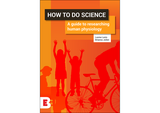
How to do science: a guide to researching human physiology has been written for students of the life sciences who are actively engaged in the scientific process. A lot of support is available for students learning scientific facts, but we found that it was harder to find resources to support students to become scientists.
This ebook introduces you to what it means to be a scientist. You will learn about the scientific method and how to do many tasks of a scientist, your roles and responsibilities as a scientist as well as possible career paths, and how to use your skills as a science graduate to get a leg up in the job market.
This text is published by the La Trobe eBureau.
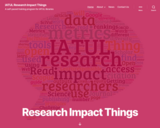
The programme aims to equip learners with the skills and knowledge required to engage in the use of a range of metrics around research impact and gain understanding of the research landscape. This is a flexible programme – you can do as much or as little as suits you. While some Things are interlinked, each of the Things is designed to be completed separately, in any order and at any level of complexity. Choose your own adventure!
There are three levels for each Thing:
Getting started is for you if you are just beginning to learn about each topic
Learn more is if you know a bit but want to know more
Challenge me is often more in-depth or assumes that you are familiar with at least the basics of each topic
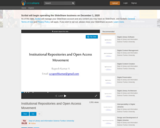
A presentation on Institutional Repositories and Open Access Movement by Rupesh Kumar A, Assistant Professor, Department of Studies and Research in Library and Information Science, Tumkur University, Tumakuru, Karnataka, India.
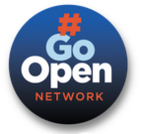
On April 18, 2023, #GoOpen held a public webinar titled, "Integrating OER into Instructional Initiatives." The session featured Rebecca Henderson, Curriculum Services Supervisor, Westmoreland Intermediate Unit, PA; Tracy Rains, Virtual Learning Specialist, Appalachia Intermediate Unit 8, PA; and, Kelly Hammond, OER and Open Pedagogy Adjunct, CUNY School of Professional Studies; and facilitator, Amee Evans Godwin of ISKME and the #GoOpen National Network.
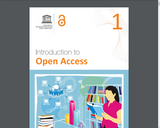
Progress of every profession, academic discipline and society at large rides on the back of research and development. Research generates new information and knowledge. It is a standardized process of identifying problem, collecting data or evidence, tabulating data and its analysis, drawing inference and establishing new facts in the form of information. Information has its life cycle: conception, generation, communication, evaluation and validation, use, impact and lastly a fuel for new ideas. Research results are published in journals, conference proceedings, monographs, dissertations, reports, and now the web provides many a new forum for its communication. Since their origin in the 17th century, the journals have remained very popular and important channels for dissemination of new ideas and research. Journals have become inseparable organ of scholarship and research communication, and are a huge and wide industry. Their proliferation (with high mortality rate), high cost of production, cumbersome distribution, waiting time for authors to get published, and then more time in getting listed in indexing services, increasing subscription rates, and lastly archiving of back volumes have led to a serious problem known as "Serials Crisis". The ICT, especially the internet and the WWW, descended from the cyber space to solve all these problems over night in the new avatar of e-journals. Their inherent features and versatility have made them immensely popular. Then in the beginning of the 21st century emerged the Open Access (OA) movement with the Budapest Open Access Initiative (BOAI). Philosophy of open access is to provide free of charge and unhindered access to research and its publications without copyright restrictions. The movement got support from great scientists, educationists, publishers, research institutions, professional associations and library organizations. The other OA declarations at Berlin and Bethesda put it on strong footings. Its philosophy is: research funded by tax payers should be available free of charge to tax payers. Research being a public good should be available to all irrespective of their paying capacity. The OA has many forms of access and usage varying from total freedom from paying any charges, full permission to copy, download, print, distribute, archive, translate and even change format to its usage with varying restrictions.
In the beginning, OA publications were doubted for their authenticity and quality: established authors and researchers shied away both from contributing to and citing from OA literature. But Committee on Publication Ethics (COPE, 1997) and its code of conduct formulated in collaboration with DOAJ and OASPA, etc. have stemmed the rot. They have defined best practices and compiled principles of transparency for quality control to sift the grain from the chaff; to keep the fraudulent at bay. Now it is accepted that contributors to OA get increased visibility, global presence, increased accessibility, increased collaboration, increased impact both in citations and applications, and lastly instant feedback, comments and critical reflections. This movement has got roots due to its systematic advocacy campaign. Since 2008 every year 21-27 October is celebrated as the OA week throughout the world. There are many organizations which advocate OA through social media and provide guidance for others.
Open Access research literature has not only made new ideas easy and quick to disseminate, but the impact of research can be quantitatively gauged by various bibliometric, scientometric and webometric methods such as h-index, i-10 index, etc. to measure the scientific productivity, its flow, speed and lastly its concrete influence on individuals, and on the progress of a discipline. The OA movement is gaining momentum every day, thanks to technology, organizational efforts for quality control and its measureable impact on productivity and further research. It needs to be strengthened with participation of every researcher, scientist, educationist and librarian. This module covers five units, covering these issues. At the end of this module, you are expected to be able to:
- Define scholarly communication and open access, and promote and differentiate between the various forms of Open Access;
- Explain issues related to rights management, incl. copyright, copy-left, authors’ rights and related intellectual property rights;
- Demonstrate the impact of Open Access within a scholarly communication environment.
This is Module One of the UNESCO's Open Access Curriculum for Library Schools.
Full-Text is available at http://unesdoc.unesco.org/images/0023/002319/231920E.pdf.
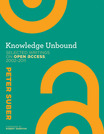
In these texts, Peter Suber makes the case for open access to research; answers common questions, objections, and misunderstandings; analyzes policy issues; and documents the growth and evolution of open access during its most critical early decade.
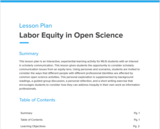
Labor Equity in Open Science is an interactive lesson plan designed to introduce students to labor equity issues in open science practices. The lesson is designed for MLIS students, and assumes no prior knowledge. During the lesson, students are given a persona representing a researcher, encompassing various professional and personal identities. Students are then given multiple scenarios and asked to predict how their persona would respond and why. Through group discussion and personal reflection, students consider the ways that researchers in different positions engage with open science in different ways.
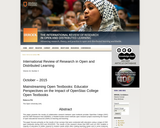
This paper presents the results of collaborative research between open textbook provider OpenStax College (OSC) and the OER Research Hub (OERRH), a Hewlett funded mixed methods open research project examining the impact of open educational resources (OER) on learning and teaching.
The paper focuses primarily on the results of two surveys that were conducted with educators using a range of OSC open textbooks during 2013 and 2014/2015. The results of this research shows that OER such as OSC enables a majority of educators to better respond to student needs whilst often making teaching easier and in some instances changing teaching practices. Although this paper does not focus on the impact of OER on students, a majority of educators surveyed perceive an increase in student satisfaction when using OER such as OSC and believe that OSC are saving students money.

Quickly following what many expected to be a wholesale revolution in library practices, institutional repositories encountered unforeseen problems and a surprising lack of impact. Clunky or cumbersome interfaces, lack of perceived value and use by scholars, fear of copyright infringement, and the like tended to dampen excitement and adoption. This collection of essays, arranged in five thematic sections, is intended to take the pulse of institutional repositories—to see how they have matured and what can be expected from them, as well as introduce what may be the future role of the institutional repository.
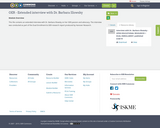
This file contains an extended interview with Dr. Barbara Illowsky on her OER passion and advocacy. The interview was conducted as part of the Dual Enrollment & OER research report produced by Hanover Research.
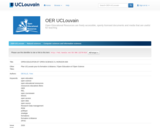
Après un premier Plan Stratégique Numerique, décliné de 2015 à 2020, l'UCLouvain se dote en 2021 d'un nouveau projet de transformation numérique à l'horizon du 600e anniversaire de l'institution. Il contribue à la mise en place d'objectifs d’ouverture (Open Science, Open Education, dynamique internationale via Circle U.) et d' innovation (transformation de l’environnement pédagogique). Prolongeant l’expérience numérique développée ces dernières années, ce projet (document PDF, sous licence CC-BY) vise à en pérenniser les résultats, en matière d'Open Education, d'Open Sience et de formation à distance.

Students will engage in problem-based learning to determine the cause of a described disease and find published sources that will help develop a treatment protocol. (The wrinkle is that students will not have the same access to information.)
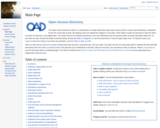
The Open Access Directory is an online compendium of factual lists about open access to science and scholarship, maintained by the community at large. It exists as a wiki hosted by the School of Library and Information Science at Simmons University in Boston, USA. The goal is for the open access community itself to enlarge and correct the lists with little intervention from the editors or editorial board. For quality control, editing privileges are granted to registered users. As far as possible, lists are limited to brief factual statements without narrative or opinion.
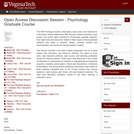
This OER Package includes a description, lesson plan, and materials for a discussion session addressing: Why are open research practices, open access, and author rights important to Psychology graduate students? How might tools and resources related to these impact choices graduate students may make in research design, research practice and documentation, and venues for sharing research results?
This session included a pre-class reading assignment and an in-class session with discussion and hands-on activities. The topics of focus were: open research practices, open access, and selecting publication venues for sharing research. These topics were discussed in the context of authorship as experienced by students in undergraduate and graduate programs, including course papers, theses and dissertations, conference presentations, and journal article publishing. Discussions were based on three readings completed prior to the in-class session that covered aspects of: open access, peer review, and open research practices. The class also discussed evaluation criteria to use when selecting a publication venue.
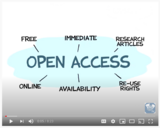
"Open Access Explained" is an excellent short YouTube video created by Nick Shockey and Jonathan Eisen that explains the reasoning for Open Access publishing.
Open Access publishing with a Creative Commons Attribution License Ageement, for example (CC-BY 4.0 Interntional) for publications and research data is currently required by federal agencies within the United States with Publication/Data public access policies. In addition, more International Foundations like the Gates Foundation have established an Open Access Policy effective for all new agreements.
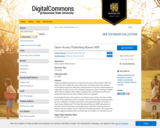
Academic publishing processes are shaped by the ways in which scholars within the field review and evaluate the work of their peers. In an ideal world, these methods would simply promote the publication of the best forms of research without prejudice or subjectivity. In reality, issues such as Knobloch-Westerwick, Glynn, and Huge’s Matilda effect, Merton’s Matthew effect, Blank’s institution bias, and Robert’s and Verhoef’s gender bias shape the ways that scholarly inquiry are evaluated.
Knowing that the peer review process can introduce issues of bias, what then of other aspects of the publishing cycle? For example, what of the subvention funding provided by some institutions to support their faculty in pursuing dissemination of research in Open Access (OA) journals? This Open Educational Resource (OER) will present an overview of the OA landscape and provide learners with tools to develop their own inquiries into the inequities present within the OA publishing industry. All assignments include suggested grading rubrics and build upon one another in a cumulative manner.
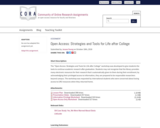
The “Open Access: Strategies and Tools for Life after College” workshop was developed to give students the tools to continue academic research after graduation. Students may not recognize that the library provides many electronic resources for their research that is automatically given to them during their enrollment; by acknowledging their privileged access to information, they are prepared to be responsible researchers beyond campus. The workshop was requested by international students who were concerned about losing access to LMU resources when they returned home.
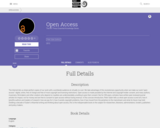
The Internet lets us share perfect copies of our work with a worldwide audience at virtually no cost. We take advantage of this revolutionary opportunity when we make our work "open access": digital, online, free of charge and free of most copyright and licensing restrictions. Open access is made possible by the Internet and copyright-holder consent, and many authors, musicians, filmmakers and other creators who depend on royalties are understandably unwilling to give their consent. But for 350 years, scholars have written peer-reviewed journal articles for impact, not for money and are free to consent to open access without losing revenue. In this concise introduction, Peter Suber tells us what open access is and isn't, how it benefits authors and readers of research, how we pay for it, how it avoids copyright problems, how it has moved from the periphery to the mainstream and what its future may hold. Distilling a decade of Suber's influential writing and thinking about open access, this is the indispensable book on the subject for researchers, librarians, administrators, funders, publishers and policy makers.
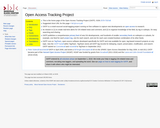
OATP is a crowd-sourced social-tagging project running on free software to capture new developments on open access to research. Its mission is (1) to create real-time alerts for OA-related news and comment, and (2) to organize knowledge of the field, by tag or subtopic, for easy searching and sharing.